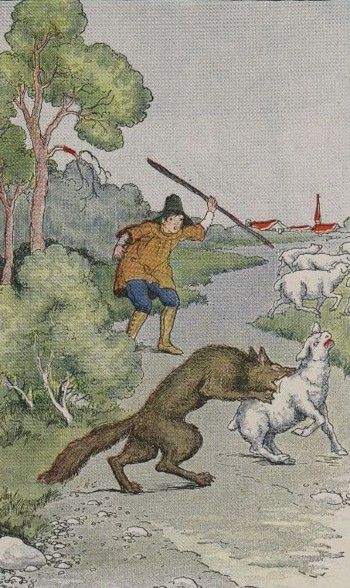| 1. amuse | / uh-MYOOZ/ |
| -to hold the attention of (someone) pleasantly; entertain or divert in an enjoyable or cheerful manner: | |
| The contestant amused the judges with her wit. | |
| 2. drop | /drop/ |
| -to discontinue | |
| The new supervisor dropped his tasks to meet a client in another city. | |
| 3. spring | /spring/ |
| -to rise, leap, move, or act suddenly and swiftly | |
| A fox sprang at the unsuspecting dog. | |
| 4. fool | /fool/ |
| -to trick, deceive, or impose on: | |
| He thought he could trick her again. | |
| 5. liar | /LAHY-er/ |
| -a person who tells lies. | |
| Once a liar, always a liar. |

One day as he sat watching the Sheep and the quiet forest, and thinking what he would do should he see a Wolf, he thought of a plan to amuse himself.
His Master had told him to call for help should a Wolf attack the flock, and the Villagers would drive it away. So now, though he had not seen anything that even looked like a Wolf, he ran toward the village shouting at the top of his voice, “Wolf! Wolf!”
As he expected, the Villagers who heard the cry dropped their work and ran in great excitement to the pasture. But when they got there they found the Boy doubled up with laughter at the trick he had played on them.
A few days later the Shepherd Boy again shouted, “Wolf! Wolf!” Again the Villagers ran to help him, only to be laughed at again.
Then one evening as the sun was setting behind the forest and the shadows were creeping out over the pasture, a Wolf really did spring from the underbrush and fall upon the Sheep. In terror the Boy ran toward the village shouting “Wolf! Wolf!” But though the Villagers heard the cry, they did not run to help him as they had before. “He cannot fool us again,” they said.
The Wolf killed a great many of the Boy’s sheep and then slipped away into the forest.
Liars are not believed even when they speak the truth.
| 1. | What was his master’s instruction in case a wolf attacks? |
| 2. | How did the Shepherd try to fight his boredom? |
| 3. | How did the villagers respond when the Shepherd asked for help for the third time? |
| 1. | How would you describe the characteristics of the Shepherd? |
| 2. | If you were one of the villagers, would you still help him for the third time? Why or why not? |
| 3. | If you were the Shepherd’s master, how would you handle the disaster? |
| 4. | The fable’s lesson is “Liars are not believed even when they speak the truth.” Do you agree with this? Why or why not? |
| 5. | Do you think it is good to tell white lies? Please explain your answer. |
| Grammar 文法 |
Pronunciation 発音 | Vocabulary 単語 |
Comprehension 理解 |
|
|---|---|---|---|---|
 GOOD GOOD |
文法の誤りはほとんどなく、完全な文章で話すことができる | ほとんどの単語をはっきりと正しく発音することができる | 習った表現を適切に使うことができる | 文章を理解し、質問に正しく答えることができる |
 FAIR |
文法の誤りはあるが、完全な文章で話すことができる | 発音の練習が必要な言葉がいくつかある | たまにミスはあるが、習った表現を適切に使うことができる | 文章を完全に理解するのは難しく、質問に正しく答えられないときもある |
 POOR |
文章で話すのは難しく、単語だけで話すことができる | 発音の練習が必要である | 習った単語と表現を少しだけ使うことができる | 文章を理解するのは難しく、質問に答えるのは難しい |
An eBook from The Project Gutenberg.
This eBook is for the use of anyone anywhere at no cost and with almost no restrictions whatsoever. You may copy it, give it away or re-use it under the terms of the Project Gutenberg License included with this eBook or online at www.gutenberg.org